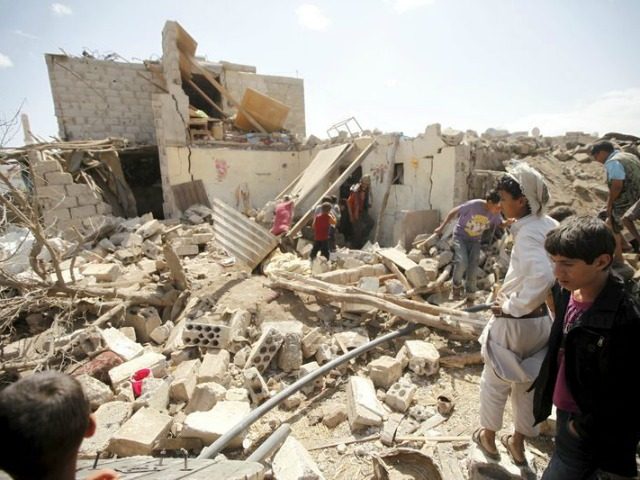SANA’A, Yemen (AP) — Dozens of prisoners and security personnel were feared dead after Saudi-led airstrikes on Saturday battered two prisons inside a security headquarters in a western port city, security and medical officials said.
The airstrikes bombed the al-Zaydiya security headquarters in the Red Sea port city of Hodeida. The building contained two prisons and many prisoners along with security forces have been killed in the strikes, the officials said.
The city is under control of Yemen’s Shiite Houthi rebels who have seized the capital and much of the northern region in 2014. The Houthis’ TV network al-Masirah said that 43 people were killed in the airstrikes but it was not immediately possible to verify its account.
The airstrikes came hours after warplanes rained bombs on houses of civilians in the western city of Taiz, killing at least 18 people, including children, earlier in the day.
The latest airstrikes come at a time Yemen’s president in exile has turned down a UN peace deal aimed at ending the country’s devastating conflict, saying it “rewards” Yemen’s rebels.
The proposed peace deal gives the Houthi rebels — who seized the capital Sana’a in 2014 and eventually forced President Abed-Rabbo Mansour Hadi out of Yemen — a share in the future government. It also reduces some of the president’s powers in exchange for a rebel withdrawal from major cities.
Hadi made his remarks during a visit by the UN Envoy to Yemen Ismail Ould Cheikh Ahmed in the Saudi capital, Riyadh, on Saturday.
“The Yemeni people have condemned these ideas and the so-called road map out of belief that the deal is a gateway to more suffering and war,” a statement by the presidency quoted Hadi as saying.
“The ideas presented … carry the seeds of war,” he added. “It rewards the coup leaders and punishes the Yemeni people at the same time.”
The statement said Hadi told Ahmed that peace is only attainable when the rebel “coup” is reversed, based on a UN Security Council resolution that stipulates the rebels must lay down their weapons and withdraw from cities as a precondition to any peace agreement.
A presidency official told The Associated Press that Hadi has come under heavy international pressure to accept the deal. He said that ambassadors of the United States, France, China and Russia have held meetings with Hadi and his prime minister in the past 24 hours to press him to accept the deal. The official spoke on condition of anonymity because of the sensitivity of the issue.
The conflict in Yemen has left more than 10,000 dead and injured and displaced nearly 3 million people. The Arab world’s poorest nation had already been suffering from high rates of malnutrition, and the war and a blockade imposed by a Saudi-led military coalition have pushed the country deeper into starvation and turmoil.
Rights groups have accused the Saudi-led coalition of killing civilians, while trying to target rebels. Weddings, funerals, schools and hospitals have been bombed in the past year.
Witnesses say a car bomb exploded Saturday in the southern city of Aden at a checkpoint steps away from the central bank, which had been relocated recently from the rebel-held capital of Sana’a.
The bomb wounded three soldiers and caused panic in the busy commercial district of Crater, the witnesses said, speaking on condition of anonymity because of security concerns.
Aden is the temporary capital of the internationally-recognized government which was forced out of Sana’a by the rebels in 2014. A Saudi-led military coalition has since intervened and continues to battle the rebels alongside forces loyal to Hadi. This summer, Hadi ordered the relocation of the country’s central bank from Sana’a to Aden, amid accusations that the rebels were misusing state funds.
Also on Saturday, two families of 18 people were killed when warplanes bombed their houses in a southern district called al-Salw, in the war-torn western city of Taiz.
Taiz, the cultural center of Yemen, has been torn between coalition-backed forces and the Houthi rebels for the past year and a half. The district that came under attack is close to the front line, and officials said that it is often difficult to distinguish rebels from government forces.
The fighting between the two sides intensified in al-Salw in recent days and many families have fled their homes.
The officials spoke on condition of anonymity because of security concerns.

COMMENTS
Please let us know if you're having issues with commenting.